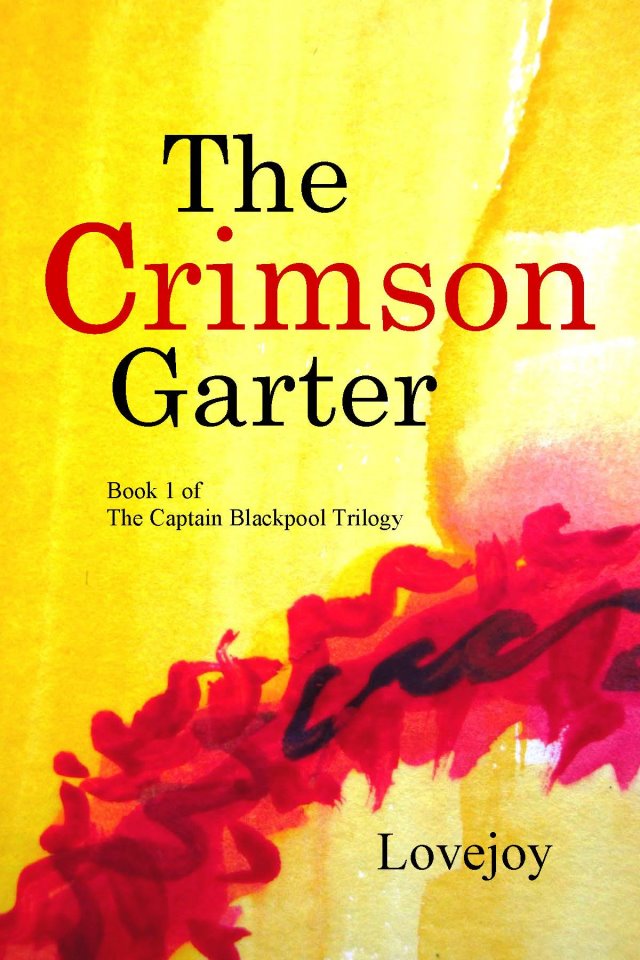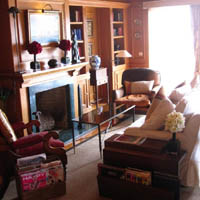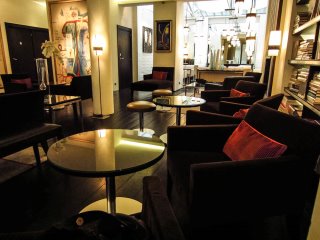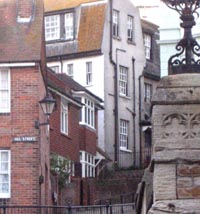
The letter that Balthazar wrote to Grazia is now in Capt Blackpool’s possession, after dramatic turns of events at the ball in Paris. Meanwhile, Sir Robert Marsh arrives back in the Scottish Highlands, as we open chapter 15 of The Crimson Garter, by Lucire travel editor Stanley Moss, writing pseudonymously as Lovejoy
Chapter 15
Deep in the Highlands of Scotland a chilly mist clung to the heather, girdling the ancient rocks, damping the furtive rustle of hidden creatures, or the simple call of a wistful bird in flight. A solitary figure on horseback slowly climbed a rugged hill, riding steadily into the persistent drizzle, his damp cloak wrapped tightly about him, and his top hat pulled down to shield his eyes. At the top of the hill a stone gateway could be seen, and the rider knew what the black draped crepe over the arch meant. Sir Robert Marsh had left London with many misgivings, not least of which was the letter from Grace, which announced her mysterious departure. But the summons from Lady Dorothea called to him louder, he had made his decision, and the black crepe validated his deepest fear. He dismounted, opened the heavy metal gate and walked the weary horse to the entry of Marshmoor.
‘Mother has been in ill health for a long time,’ he thought. ‘I never expected that she would be taken from me so soon. Had it been any other occasion I should have been blissfully happy to return home to my library and my wife. But now the world has been thrown into chaos. My wife is gone, and my beloved mother as well.’
Sir Robert’s ruminations were interrupted by the sudden appearance of Cedric at the entrance. The elderly butler opened the heavy door, which too was garlanded in black. Murmuring condolences, Cedric helped Sir Robert to remove the cloak, called for a stable boy, and speaking unconsciously, comforted himself, ‘The master has finally arrived.’
‘I know you have many questions,’ Sir Robert told him. ‘Spare me no details in your report. You may inform the staff Lady Grace remains in London awaiting my instructions. Now let me hear everything.’
Cedric engaged Sir Robert’s eyes, uncharacteristically. ‘There is much to tell, wee Robbie,’ he began. ‘Much to tell and little of it easy. Cook has already left us, and Molly is in a fit of hysterics in the kitchen. Pearl refuses to leave her chambers in the east wing. Mr Potts has stayed inebriated in the cellar two full days now, and cannot be consoled. Arthur is nowhere to be found. The task has fallen to me, sir, to express the deepest sentiments of the remaining staff, and to communicate to you their—ahem—concern about the permanence of their positions. If you could only say a word of reassurance to them … Bishop Duncan and Dr Lipster await you in the library.’
This barrage of disclosure was nearly too much for Sir Robert, who tried to inventory just who did what and where they all fit into the elaborate puzzle of the household. Before Cedric opened the library door, he again stepped outside of protocol and placed his hand reassuringly on Robert Marsh’s shoulder. ‘A terrible tragedy, terrible, terrible. But now the Master is home, and you must take command.’ He formally opened the doors to the library, and the Bishop and Doctor immediately stood up.
‘She passed away from us mercifully, quickly and quietly,’ said the Bishop, approaching Robert and taking his hand.
‘She had no pain,’ the Doctor said, shaking Robert’s other hand, much to his discomfort.
‘Her illness?’ Marsh asked. ‘I did not expect my mother to go so soon. She seemed well enough, and such crises had passed before.’
Dr Lipster looked down at his feet and searched for the correct words. ‘I am afraid she may have over-measured her usual dose of laudanum, for there was evidence that she swallowed nearly half a bottle, most curious. I took the liberty of removing this odd newspaper clipping from her hand, which I found clutched in her death grip. Of its particular meaning I am not sure, but it must have had some strange significance to her which perhaps we will never know. What fascination she would have had for such a lurid and obscure item of gossip …’ He paused and handed Sir Robert the article from Treadwell’s, which described the scandal surrounding The Crimson Garter. ‘It was certainly the effects of laudanum which took her from us. To be sure the end was near, and the tincture helped to ease her suffering. How fortunate that you have finally arrived, for her remains need to be attended to, and Cedric informs me that Pearl has already begun to prepare her for her final journey to the grave.’ The doctor looked about nervously. ‘I have had to be away from my practice these two days,’ he stammered. ‘Your mother was not quite current with her charges, and I have taken the liberty of placing an invoice under the blotter upon your desk. And now that my services are no longer needed I will remove myself, Sir Robert, to leave you to your grieving.’
The Bishop, having yet excused himself, stood at the fireplace in a vain attempt at gaining warmth from the meagre grate. Once the doctor was gone he sidled up to Marsh, his hands gripped together in an attitude of mercy. ‘I have prayed for Lady Dorothea’s soul,’ he said mournfully. ‘Your mother’s piety and generosity will serve her well on the other side. And in this world her righteousness will be remembered. I hope that we can count on you to continue her virtuous works and honour her final wishes. She has left specific instructions with me for her funeral, and with your permission I will now go over them with you. Unless you would like me to lead you first in some appropriate prayer.’
Sir Robert regarded the man irritably. ‘I have only just arrived, and while I understand the haste with which you desire to make your arrangements I have not yet even seen my mother, let alone offered consolation to those who so loyally cared for her in her final hours. If you will forgive me, sir, I will leave you, and shall return as soon as I visit my dear departed mother one last time.’ The Bishop acquiesced, wrinkled his nose and attempted to hide his displeasure at Sir Robert’s slight.
The room was unusually cold where they had laid out the body of Lady Dorothea Marsh. She rested in the middle of her bed, a tiny figure in a simple black dress, her hands clasped over her middle, eyes closed, pallid. Sir Robert knew instantly she was not there, for whatever powerful presence she had exerted in life was long gone.
‘I am sorry,’ he said to her, even though he knew she would not answer. ‘I can only hope you had no pain, and at least nothing more in this life will torment you. I swear to you I will find Grace and bring her back. I will be sure that our honour is defended. I know you cannot rest until this disgrace is revenged.’ Robert Marsh tried to summon some sadness, but it surprised him what he felt: relief, as if a restraint had been removed, and he could now act without the unyielding scrutiny he had endured for years. ‘I am sorry,’ he could only say again. ‘Truly sorry for any disappointment I have caused you.’
After his time in the room with Lady Dorothea’s remains, Robert Marsh collected himself and returned to the study. Outside the doors he found Cedric lurking once again. ‘Begging your pardon, sir, but I neglected to mention earlier that there are two gentlemen awaiting you in the parlor, lawyers, Mr McGowan, who has come all the way up from Edinburgh, and Mr Cribbs here from Glasgow. In the billiards room you will also find Misters Dumble and Pym waiting.’
‘Who are they?’
‘One is the parish architect, and the other a stonemason.’
‘And they are here because …’
‘If I am not mistaken, sir, Pym desires to discuss your mother’s tomb.’
Sir Robert nodded absently. ‘The tomb.’ But Cedric’s expression indicated he had more to offer.
‘Mr Brown, who oversees the tenant farmers and handles business in the village, is still seated in the foyer. And another gentleman.’ Sir Robert nodded again, and attempted to turn in the direction of the sitting room.
‘Not that way just yet, Sir Robert,’ Cedric suggested reluctantly. ‘Inside there you will find the ladies of the parish, Mrs Webster, Mrs Macreedy, and two committee women from the local orphanage.’
‘What is the meaning of all these people? My mother did not know all of these people.’
‘Evidently many wish to express their sympathy. May I suggest you deal first with Mr McGowan and Mr Cribbs, for it is clear they have much to impart about the issues of inheritance. I think you will find the formal dining room available, as no one is seated there at the moment.’
‘Very well,’ Sir Robert agreed, for it was also clear that Cedric had a better idea of what needed to occur. ‘Send for McGowan and Cribbs.’
Once he had received the lawyers in the vaulted room at the immense table Robert Marsh wasted no time. ‘Gentlemen,’ he said, ‘I have discovered an unthinkable number of people here who wish to see me about I do not know what. Please make your business as brief as possible.’
‘A capital idea,’ McGowan agreed. ‘We are perfectly aware of the number of supplicants here, since they are all mentioned in the will, and in fact it was we who summoned them to hear the reading and learn of their bequests.’
‘All mentioned in the will?’ Sir Robert sputtered. ‘Am I to understand that everyone, the ladies in the parlour, the Mrs Websters, those do-gooders from the orphanage, even Dumble and Pym, all are named in my mother’s will?’
‘Just so,’ McGowan said with a satisfied expression on his jovial face. ‘Difficult as it is for you to believe, your mother’s munificence has been quite widespread. She has quietly shepherded and sustained a number of worthy causes.’
Marsh briefly reflected on the irony of the situation. The last time he had sat at this grand table he had supped with his wife and mother before leaving for London. The world had then seemed a certain place, and the only conundrum had been the strange purloining of the Wickham Library. But since that night all had changed, he had gone to London, been greatly perplexed at the auction, his wife had left him, his mother had passed away, and there had been a curious silence from the Earl of Pinckney regarding the scandalous painting, whose existence had provoked the untimely demise of his beloved mother.
Mr McGowan cleared his throat. ‘Sir Robert, if you will allow us,’ he said, and opened two enormous valises which had lain at his feet out of Marsh’s view. From the valises he produced two tall stacks of documents, obviously heavy, which he laboriously placed on the table, one at each of his fleshy elbows.
‘I beg your pardon, gentlemen,’ Marsh said. ‘While I appreciate your conscientiousness, I do not believe it was necessary that you needed to come up all the way from Edinburgh simply for the reading the will. And I hope that there is no additional charge forthcoming for your most thoughtful appearance.’
‘My good man, no,’ McGowan assured him. ‘In the case of holdings so extensive it is customary, always the policy of the firm to send a representative, in order to protect our client’s interests, and to see that the bequests of the deceased are honoured to the letter. You may rely on us to act on your behalf in the most faithful manner. We do believe it would be more expeditious to attend to the bequests first, and the reading of the assets—privately—afterward. With your consent, of course.’
Puzzled and suspicious, Sir Robert agreed, and eventually all of the diverse folk who had descended upon his house took places around the table and lining the walls. It was an uncomfortably large group, and Mr McGowan appeared to enjoy the audience.
First there came the usual bequests of small and tidy sums for those in consideration of their faithful service. The magnitude of them seemed a bit extravagant to Marsh, and uncharacteristic of his mother, but as he looked over the lawyer’s shoulder and onto the document written in her absolutely unmistakable spidery hand, he recognized that these were the numbers which she herself had recorded and so he could not dispute them. Cedric, Molly, Pearl, Potts, the gamesmen—as well as the cook who had disappeared—would all be well taken care of, whether he decided to engage them or not. For each there was also the bewildering but outrageous grant of a small plot of land, only a few acres outside of Dingwall it was true, but to him it seemed extreme. He bit his tongue as the lawyers methodically went through the lists, enumerating the gifts to various charities represented by the ladies of the parish, who bobbed their heads in a satisfied way when their specific causes were acknowledged. Mrs Macreedy, administrator of the Orphanage of Bedrachen, the church of St Eustacius, Widows of the 12th Regiment, schools, hospitals, a seemingly endless number of charities were read off, to the point where Sir Robert lost tally of the final sum for which the estate would be obliged. By his calculation it seemed astronomical.
Next came the bequest to the parish of Dingwall, for the reconstruction of the church, a sum so outrageous that Sir Robert Marsh went into a fit of uncontrollable coughing, which lasted for some time. There was the stipulation that the firm of Dumble & Pym be responsible for the renovation, to which the two named gentlemen smiled modestly, nodding faintly in Sir Robert’s direction. Once the bequests had all been read Sir Robert was made to endure the grovelling handshakes of each and every beneficiary who had attended the reading. Men with caps in hands openly wept, and praised Lady Dorothea’s generosity, and assured him she would be with all the saints in heaven. Eventually, mercifully, they all departed the dining room, leaving Sir Robert alone with the lawyers.
Related articles hand-picked by our editors
 Off to London, Lisbon,
Livorno, Lille, Lahore
Off to London, Lisbon,
Livorno, Lille, Lahore
Travel editor Stanley Moss updates us on his wanderings, brought
to you by the letter L
photographed by the author
 Two Parisian hideaways
Two Parisian hideaways
Stanley Moss looks at two distinctive Parisian hotels on opposite sides of town, with very different characters
photographs by Paula Sweet and courtesy Hôtel Le A
 Rich in its memories
Rich in its memories
Stanley Moss takes in St Leonards-on-Sea, a charming seaside hamlet
in East Sussex rich in history
photographed by the author
Advertisement
Copyright ©1997–2022 by JY&A Media, part of Jack Yan & Associates. All rights reserved. JY&A terms and conditions and privacy policy apply to viewing this site. All prices in US dollars except where indicated. Contact us here.